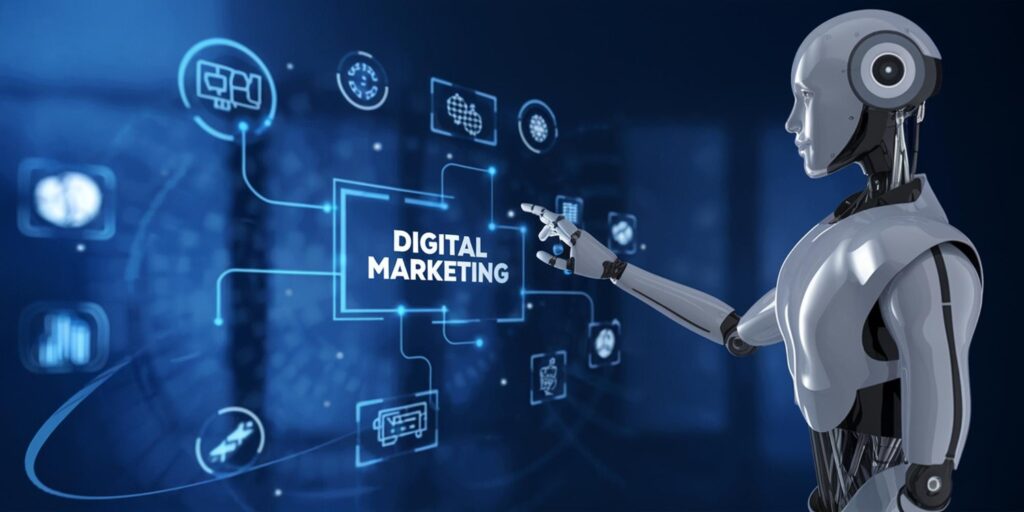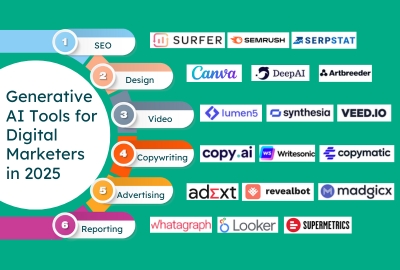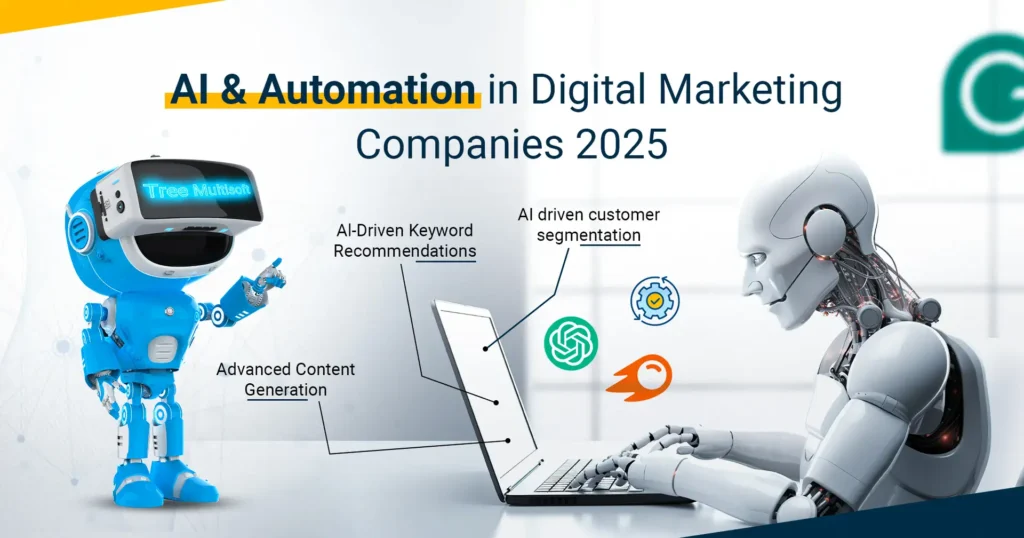Artificial Intelligence (AI) has become the driving force of almost every industry, and digital marketing is no exception. In 2025, businesses of all sizes are adopting Artificial intelligence in digital marketing to understand customer behavior, automate tasks, personalize experiences, and improve ROI. But the question remains – what actually works when it comes to AI in digital marketing in 2025?
In this blog, we’ll explore what Artificial intelligence in digital marketing means, the tools you can use, real-world examples, pros and cons, and how businesses and marketers can stay ahead in this AI-powered era.
📑 Table of Contents
- Introduction – Why AI Matters in Digital Marketing 2025
- What is AI in Digital Marketing?
- AI Digital Marketing Tools in 2025
- SEO Tools
- Design Tools
- Video Tools
- Copywriting Tools
- Advertising Tools
- Reporting & Analytics Tools
- Case Studies: How Brands Use AI
- Netflix – Hyper-Personalization with AI
- Coca-Cola – AI-Powered Consumer Engagement
- How to Use Artificial intelligence in digital marketing
- Advantages and Disadvantages of AI in Digital Marketing
- Will AI Replace Marketers?
- The Future of Artificial intelligence in digital marketing
- What Works in 2025 with AI in Digital Marketing
- How Companies Can Begin Using AI in Digital Marketing
- Final Thoughts – Artificial intelligence in digital marketing 2025 Trends
What is Artificial Intelligence In Digital Marketing?

Artificial intelligence in digital marketing refers to the use of artificial intelligence technologies—such as machine learning, predictive analytics, and natural language processing—to analyze data, automate marketing processes, and improve decision-making.
From chatbots that handle customer queries 24/7 to AI-driven ad campaigns that optimize spending in real time, AI has transformed how businesses connect with their audiences.
Why it matters in 2025? Because today’s customers expect instant responses, hyper-personalization, and seamless experiences—something only Artificial intelligence in digital marketing can deliver effectively at scale.
AI Digital Marketing Tools in 2025

1. SEO Tools
SEO (Search Engine Optimization) ensures your website ranks higher on Google. AI-powered SEO tools automate keyword research, competitor analysis, and content optimization.
- SurferSEO – Helps optimize website content by analyzing SERP data and suggesting the right keyword density, structure, and backlinks.
- SEMRush – A complete digital marketing toolkit offering SEO audits, competitor analysis, backlinks, keyword tracking, and PPC tools.
- SERPstat – Provides keyword research, competitor tracking, and site audits. Known for being cost-effective and beginner-friendly.
👉 These tools make it easier for marketers to identify ranking opportunities and optimize content effectively.
2. Design Tools
AI design tools save time by creating visuals, branding elements, and creatives.
- Canva – A user-friendly platform for creating social media posts, presentations, infographics, and videos with AI-powered design suggestions.
- DeepAI – AI-based image generator that can create unique visuals based on text prompts.
- Artbreeder – Specializes in generating and remixing images using AI; popular for creating portraits, graphics, and unique brand visuals.
👉 Perfect for marketers who want quick, professional-quality designs without hiring a designer.
3. Video Tools
Video content is one of the most engaging formats online. AI tools now make video production faster and more affordable.
- Lumen5 – Converts text (like blog posts) into engaging videos with AI-driven templates, images, and background music.
- Synthesia – Lets you create AI-generated videos with virtual presenters and voiceovers in multiple languages.
- VEED.io – Online video editor with AI subtitles, background noise removal, and social media-friendly templates.
👉 These tools allow businesses to create professional video content without expensive production teams.
4. Copywriting Tools
Generative AI copywriting tools help marketers write engaging ads, blogs, and email campaigns.
- Copy.ai – Generates blog posts, ad copy, and product descriptions quickly.
- Writesonic – Offers long-form blog writing, landing pages, and chatbot copy powered by AI.
- Copymatic – Similar to Copy.ai, but with a focus on SEO-friendly articles and multilingual support.
👉 Ideal for marketers who need fast, creative, and conversion-focused content.
5. Advertising Tools
AI-powered advertising tools help optimize ad campaigns, improve targeting, and increase ROI.
- Adext – Uses machine learning to manage ad campaigns across platforms (Google, Facebook, etc.) and automatically optimizes targeting.
- Revealbot – Automates ad management with rules, budget allocation, and performance tracking.
- Madgicx – AI-powered platform that combines analytics, automation, and creative insights for paid ads.
👉 These tools help marketers run smarter ad campaigns with less manual effort.
6. Reporting & Analytics Tools
Measuring results is key to improving marketing strategies. These AI tools simplify reporting.
- Whatagraph – Creates visually appealing marketing performance reports by pulling data from multiple platforms.
- Looker (by Google) – A powerful business intelligence tool for analyzing large data sets and visualizing trends.
- Supermetrics – Automates data collection from platforms like Google Ads, Facebook, and HubSpot into dashboards like Google Data Studio or Excel.
👉 These tools save time by automating reporting and providing deeper insights into marketing performance.
Case Study: Netflix & Coca-Cola – AI in Digital Marketing
1. Netflix – Hyper-Personalization with AI
🔹 Background
Netflix is one of the largest streaming platforms with over 270M+ global subscribers. To keep users engaged, Netflix relies heavily on AI-driven personalization.
🔹 How Netflix Uses AI in Marketing
- Personalized Recommendations
- AI analyzes user behavior (watch time, genre preferences, skipped shows).
- 80% of shows watched on Netflix come from AI recommendations.
- Dynamic Thumbnails & A/B Testing
- Netflix uses AI to generate different thumbnails of the same movie/show for different users.
- Example: A rom-com fan may see a romantic scene thumbnail, while a comedy lover sees a funny scene.
- Predictive Analytics for Content Strategy
- Before investing in new shows, AI predicts demand by analyzing social media buzz, search trends, and user data.
- Example: Netflix invested in House of Cards after AI predicted high engagement.
- Targeted Marketing Campaigns
- Netflix runs AI-driven campaigns that show different trailers & ads based on demographics, location, and behavior.
🔹 Results
- 80% engagement through recommendations.
- Saves $1B+ annually in customer retention.
- Keeps churn rate below industry average.
2. Coca-Cola – AI-Powered Consumer Engagement
🔹 Background
Coca-Cola is one of the most iconic beverage brands, present in over 200 countries. With millions of customers daily, it uses AI to maintain brand loyalty and innovate digital marketing.
🔹 How Coca-Cola Uses AI in Marketing
- AI-Powered Social Listening
- Uses AI to track conversations across social media about Coca-Cola, competitors, and new trends.
- Helps design region-specific campaigns.
- Personalized Customer Experiences
- AI analyzes purchase data to suggest customized offers via vending machines, apps, and ads.
- Example: Coca-Cola Freestyle machines (AI-driven) let customers create their own drink mix, and data is used for product innovation.
- Chatbots & Customer Service
- Coca-Cola uses AI chatbots to engage with customers online, provide offers, and answer FAQs.
- Visual Recognition in Campaigns
- Coca-Cola used AI-driven facial recognition in vending machines for marketing campaigns (e.g., smile for a free Coke).
- Content Creation with AI
- Coca-Cola partnered with OpenAI and Bain & Company to generate AI-driven ad creatives and digital campaigns.
🔹 Results
- Improved consumer engagement across 200+ markets.
- Hyper-local campaigns increased digital reach.
- Coca-Cola became the most-followed brand on Facebook (over 100M likes).
How to Use AI in Digital Marketing
Businesses and marketers can leverage Artificial intelligence in digital marketing in several ways:
- Customer Insights – AI tools analyze large amounts of data to understand customer behavior.
- Personalization – Deliver tailored product recommendations and email campaigns.
- Content Creation – Generate SEO-friendly blogs, social posts, and video scripts.
- Ad Optimization – Automate bidding and targeting for maximum ROI.
- Customer Service – Use AI chatbots for real-time support.
- Predictive Analytics – Forecast customer needs and trends.
If you are new to AI, start with one area (like automating email campaigns) and expand gradually.
What Are the Advantage and Disadvantage of AI in Digital Marketing?
Like any technology, AI has both advantages and challenges.
✅ Pros of Artificial intelligence in digital marketing
- Saves time by automating repetitive tasks.
- Improves targeting and personalization.
- Enhances customer engagement with chatbots and AI tools.
- Provides valuable insights with predictive analytics.
- Increases ROI with smart ad spend optimization.
❌ Cons of Artificial intelligence in digital marketing
- High initial setup costs for businesses.
- Dependence on data quality—bad data = poor results.
- Lack of human creativity in purely AI-generated content.
- Privacy and ethical concerns with customer data usage.
- Risk of over-reliance on technology.
Will AI Replace Marketers?
One of the most asked questions in 2025 is: Will AI replace marketers?
The answer is No. AI can automate processes, but it cannot replace human creativity, emotional intelligence, and strategic thinking. Marketers who combine AI tools with human insight are the ones who thrive.
Think of Artificial intelligence in digital marketing as a co-pilot—it enhances your capabilities, but you’re still the pilot who makes the critical decisions.
The Future of AI in Digital Marketing
The future of Artificial intelligence in digital marketing in 2025 and beyond is exciting. Here are some trends:
- Hyper-Personalized Campaigns – AI will predict customer needs before they even express them.
- Voice Search & Conversational AI – More businesses will optimize for voice-driven searches.
- AI-Driven Video Marketing – Personalized video ads generated by AI will dominate.
- Predictive Social Listening – AI tools will track conversations to forecast upcoming trends.
- AI-Powered AR/VR Experiences – Interactive experiences will become mainstream.
Businesses that adopt these trends early will stay ahead of competitors.
What Works in 2025 with AI in Digital Marketing?
Now, let’s focus on the core of this blog: what works in 2025 when it comes to Artificial intelligence in digital marketing.
- Authenticity + AI – Using AI for efficiency but keeping human touch in branding and messaging.
- Data-Driven Decisions – Businesses leveraging AI analytics to make informed marketing choices.
- AI for Personalization – From emails to ads, hyper-personalization is what drives conversions.
- Smart Content Creation – AI-generated drafts, polished with human creativity.
- AI Chatbots for Engagement – Providing instant answers without losing the personal tone.
- Video + AI – Personalized AI video ads performing 3x better than generic ones.
In short, AI in digital marketing works best when it complements, not replaces, human intelligence.
How Companies Can Begin Using Artificial intelligence in digital marketing

If you’re planning to adopt AI in your marketing strategy in 2025, here’s a simple roadmap:
- Identify Goals – Do you want better customer engagement, lead generation, or sales growth?
- Choose the Right AI Tools – Start with one tool (SEO, Ads, or CRM) instead of all at once.
- Train Your Team – Invest in upskilling marketers to use AI effectively.
- Test and Optimize – Run A/B tests with AI-powered campaigns to measure success.
- Scale Gradually – Expand AI applications across different areas once you see results.
Final Thoughts – Artificial Intelligence in Digital Marketing 2025
AI is now the foundation of contemporary digital marketing techniques, not just a trendy term. From content creation and ad optimization to chatbots and predictive analytics, the use of Artificial intelligence in digital marketing has transformed how businesses interact with customers.
In 2025, what truly works is the balance between AI efficiency and human creativity. The companies that win are not the ones replacing marketers with machines, but those who empower their teams with AI to make smarter decisions and build authentic connections with their audience.
If you are a student, entrepreneur, or business owner, adopting Artificial intelligence in digital marketing today is not just an option—it’s a necessity to stay competitive in the future.


Pingback: Best Data Analytics Course in Varanasi – Top 3 Institutes